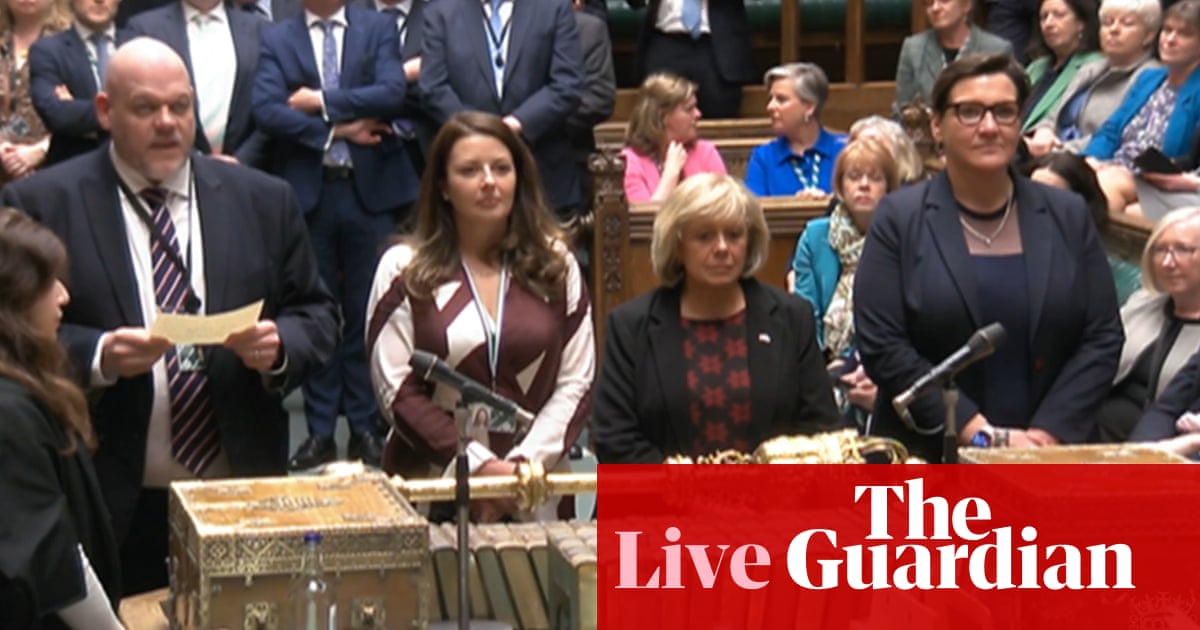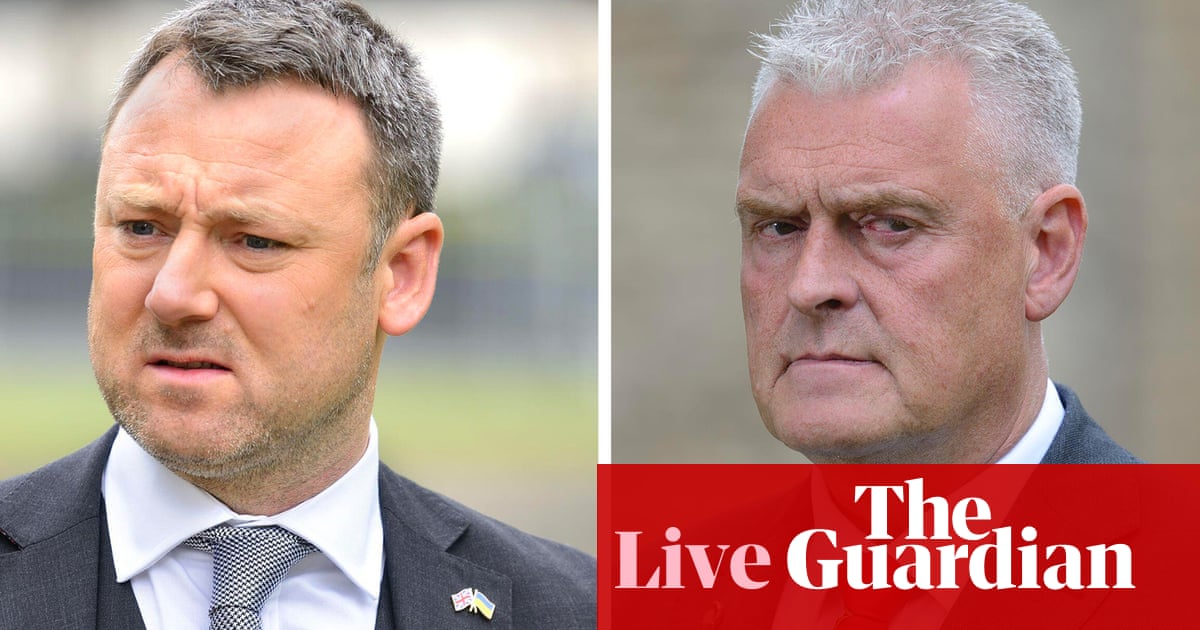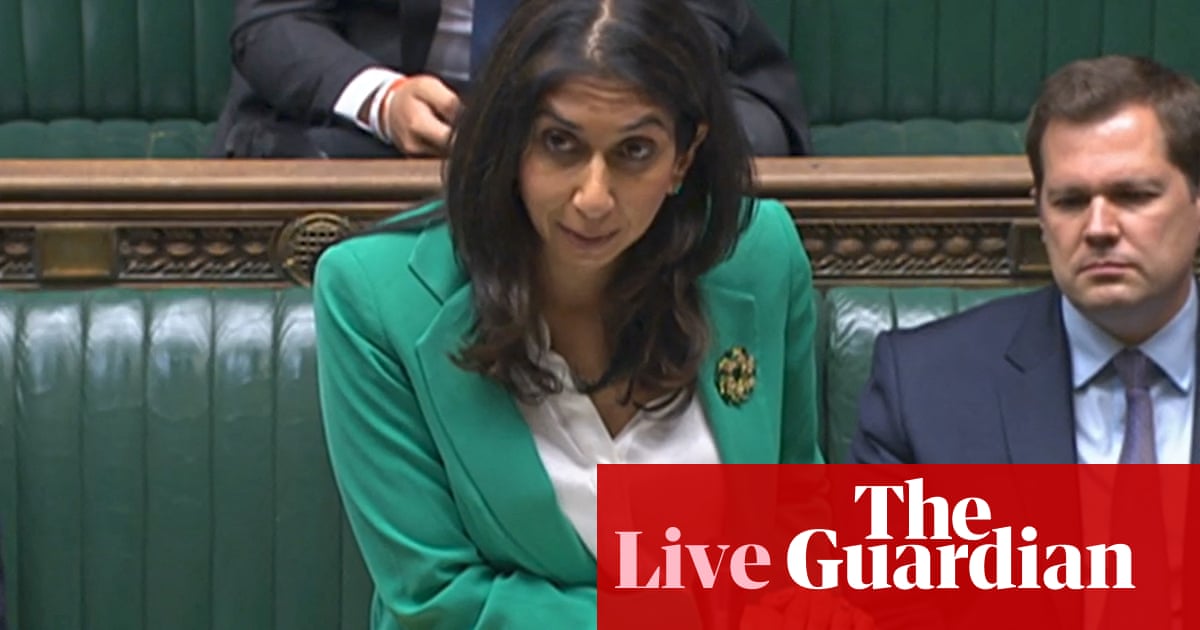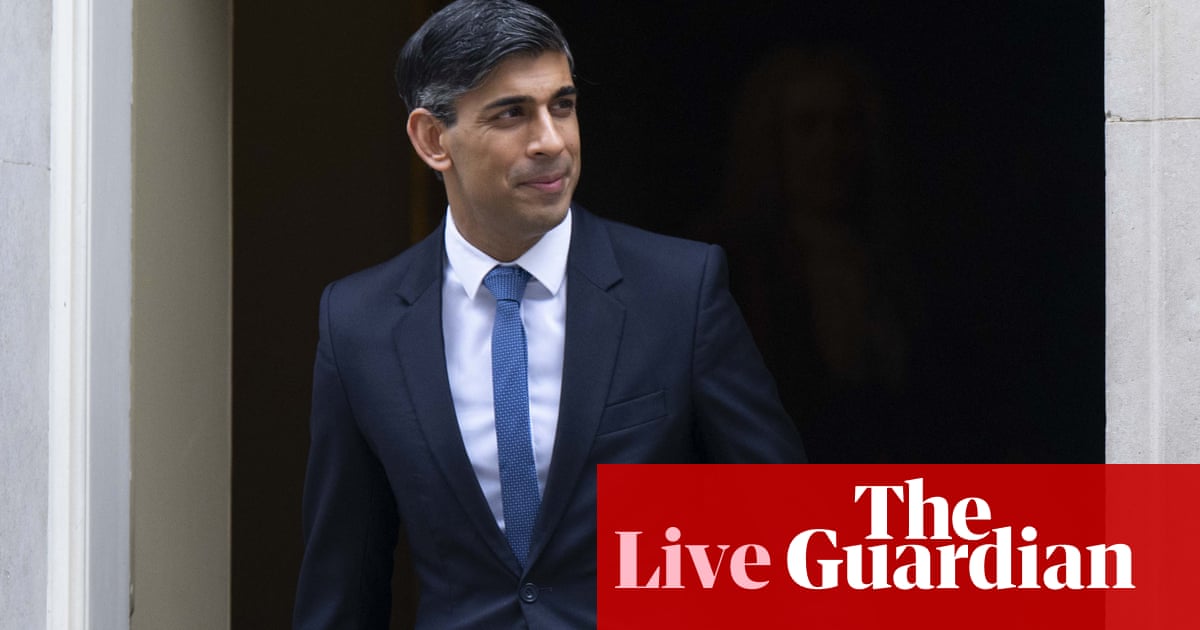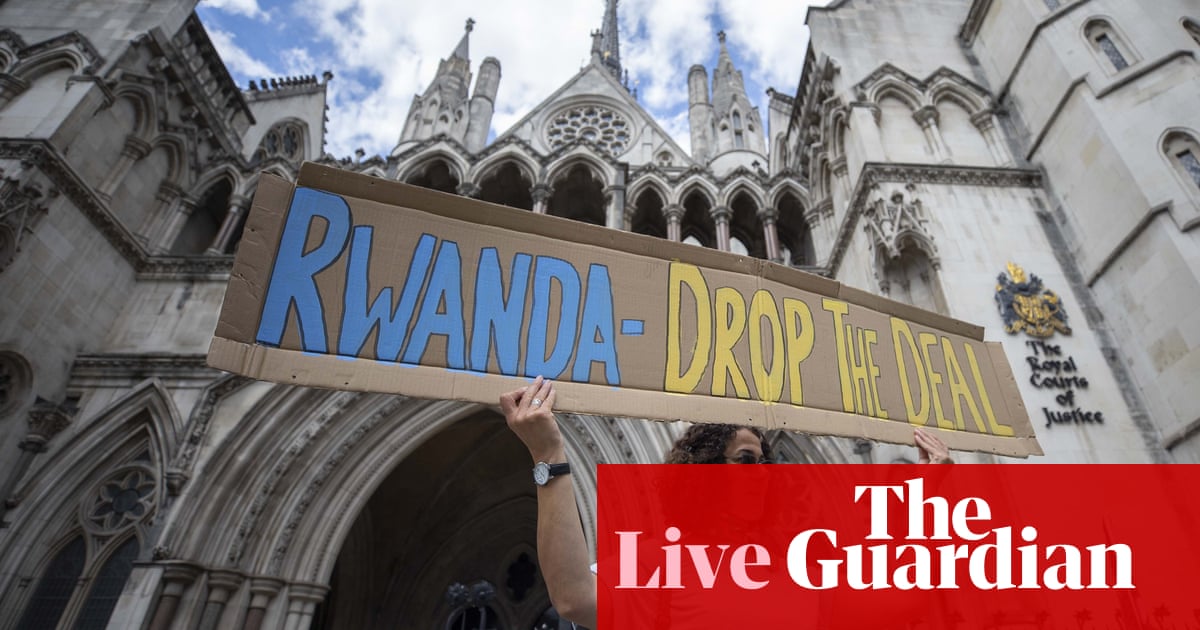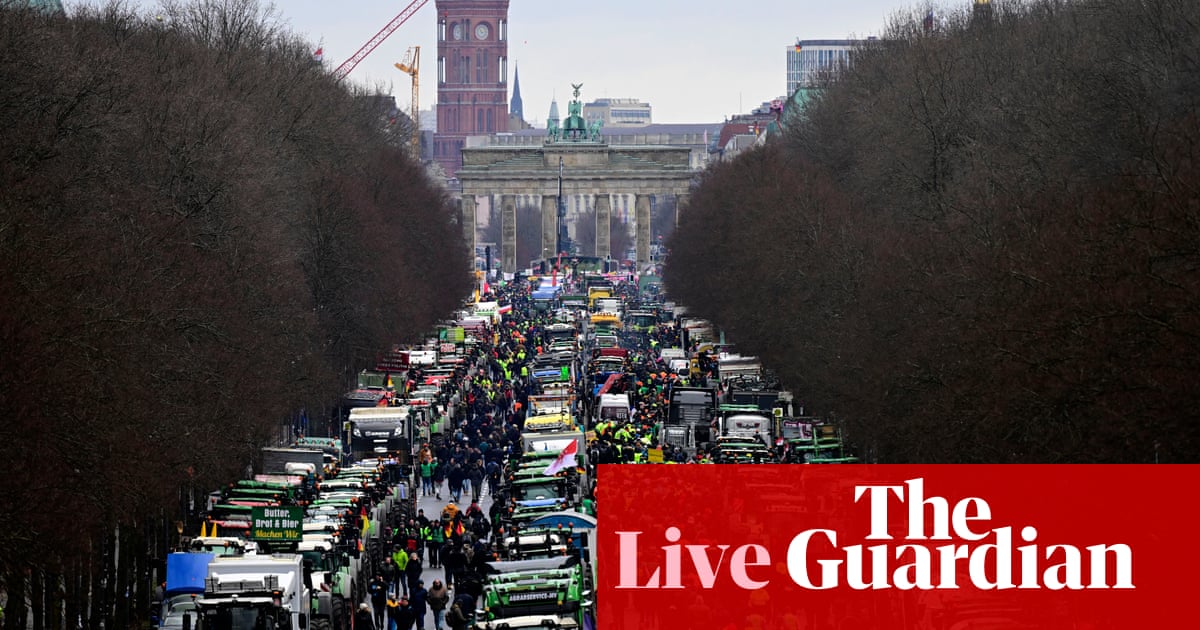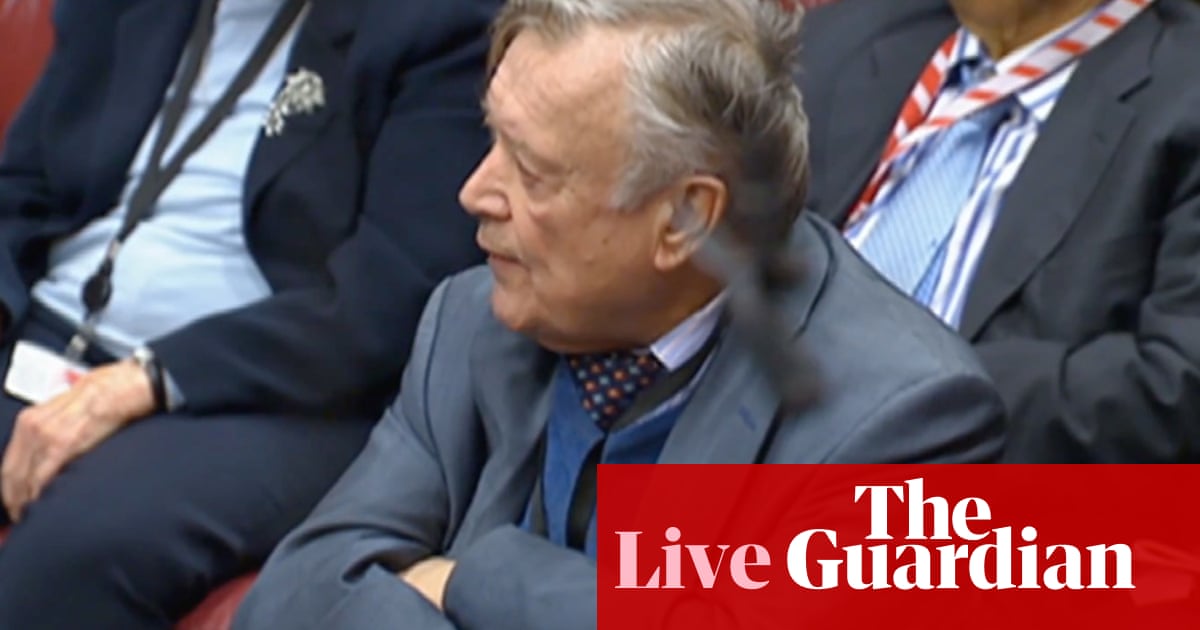
Ken Clarke says he can"t support new Rwanda bill as he did last one because overturning supreme court "very dangerous"
Last year, when the House of Lords was debating the illegal migration bill, the original legislation underpinning the Rwanda policy, there was a suprise intervention from Ken Clarke, the Conservative former chancellor. Despite being seen as a leading figure on the liberal wing of the Tory party, Clarke told peers he was backing the policy because he did not think anyone had a better solution to the problem caused by small boats.
But there is bad news for the government. In a speech this afternoon in the second reading debate, Clarke revealed that he had switched sides.
He said that he still thought the public needed to be reassured that the government was in control of its borders, and he still thought it was acceptable to remove migrants to a safe third country.
But he said the proposal to send them to Rwanda hit a “brick wall” when it was vetoed by the supreme court. And the government’s response was “quite startling”, he said. He went on:
They have decided to bring an act of parliament to overturn a finding of fact made by the supreme court of this country, and if we pass this bill, we are asserting as a matter of law that Rwanda is a safe country for this purpose, that it is always going to be a safe country for this purpose until the law is changed, and the courts may not even consider any evidence brought before them to try to demonstrate that is not a safe country.
This is a very dangerous constitutional provision. I hope it will be challenged properly in the courts because we have an unwritten constitution, and it gets more and more important that we do ensure that powers in this country are controlled by some constitutional limits, and are subject to the rule of law.
Somebody has already said in this debate that parliament apparently, claiming the sovereignty of parliament, can claim that the colour black is the same as the colour white, or dogs are cats.
Clarke said he agreed with all peers saying the legislation should be conditional on Rwanda actually showing that it has complied with the treaty it has signed saying it will implement safeguards to its immigration system. As the bill went through the Lords, he would probably back some “startling amendments”, he said.
He said the government had placed far too much faith in the Rwanda policy. But he urged the Lords not to block the bill. That would just allow the government to blame the Lords for it not being able to stop the boats, he said. It would “save this government from what are I think are its follies in crashing on with this particular policy in this way, and I hope we won’t fall into that trap.”
Early evening summary
Ken Clarke, a Conservative former chancellor and former lord chancellor, has told peers that, while he supported the government’s last Rwanda bill, he cannot support the new one because overturning a supreme court judgment is a “very dangerous constitutional provision”. (See 5.42pm.)
An inquiry has concluded that some of the decisions taken by bodies involved in the Teesworks redevelopment “do not meet the standards expected when managing public funds”. (See 5.44pm.)
George Freeman, who resigned from government last year, has said that he quit because he could not afford rising mortgage repayments on his £120,000 ministerial salary.
Nicola Sturgeon broke confidentiality and “jumped the gun” when she announced a ban on mass gatherings in Scotland before other parts of the UK agreed to the move during the pandemic, the UK Covid inquiry has heard.
The Democratic Unionist party is to consider ending its two-year boycott of power-sharing in Northern Ireland at a meeting tonight that could make or break Sir Jeffrey Donaldson’s leadership.
UK ministers will aim to stop firms from skirting around an upcoming ban on disposable vapes by eliminating ruses such as attaching charging points to them, Victoria Atkins, the health secretary, has said.
Ben Houchen, who as Conservative Tees Valley mayor has facilitated and championed the Teesworks redevelopment scheme, claims it has been vindicated by the report published this afternoon because it says that there is no evidence of corruption and illegality – despite what has been suggested by some media reports, and by Labour.
@TeesworksUK Independent Review published
👉 In black and white, “no evidence to support allegations of corruption or illegality”.
Confirms land was not sold for £100, but instead a wider deal was done worth £39m.
Inquiry finds some Teesworks redevelopment decisions "do not meet standards expected" for managing public funds
The government has just published its Tees Valley review, the report into the Teesworks redevelopment including the Teesside freeport. Here is the 96-page report, and here are the executive summary and recommendations.
The summary says:
The review panel has now completed its work within the scope of the terms of reference. Based on the information shared with the panel, we have found no evidence to support allegations of corruption or illegality. However, there are issues of governance and transparency that need to be addressed and a number of decisions taken by the bodies involved do not meet the standards expected when managing public funds. The panel have therefore concluded that the systems of governance and finance in place within TVCA [the Tees Valley Combined Authority] and STDC [the South Tees Development Corporation] at present do not include the expected sufficiency of transparency and oversight across the system to evidence value for money.
Ken Clarke says he can"t support new Rwanda bill as he did last one because overturning supreme court "very dangerous"
Last year, when the House of Lords was debating the illegal migration bill, the original legislation underpinning the Rwanda policy, there was a suprise intervention from Ken Clarke, the Conservative former chancellor. Despite being seen as a leading figure on the liberal wing of the Tory party, Clarke told peers he was backing the policy because he did not think anyone had a better solution to the problem caused by small boats.
But there is bad news for the government. In a speech this afternoon in the second reading debate, Clarke revealed that he had switched sides.
He said that he still thought the public needed to be reassured that the government was in control of its borders, and he still thought it was acceptable to remove migrants to a safe third country.
But he said the proposal to send them to Rwanda hit a “brick wall” when it was vetoed by the supreme court. And the government’s response was “quite startling”, he said. He went on:
They have decided to bring an act of parliament to overturn a finding of fact made by the supreme court of this country, and if we pass this bill, we are asserting as a matter of law that Rwanda is a safe country for this purpose, that it is always going to be a safe country for this purpose until the law is changed, and the courts may not even consider any evidence brought before them to try to demonstrate that is not a safe country.
This is a very dangerous constitutional provision. I hope it will be challenged properly in the courts because we have an unwritten constitution, and it gets more and more important that we do ensure that powers in this country are controlled by some constitutional limits, and are subject to the rule of law.
Somebody has already said in this debate that parliament apparently, claiming the sovereignty of parliament, can claim that the colour black is the same as the colour white, or dogs are cats.
Clarke said he agreed with all peers saying the legislation should be conditional on Rwanda actually showing that it has complied with the treaty it has signed saying it will implement safeguards to its immigration system. As the bill went through the Lords, he would probably back some “startling amendments”, he said.
He said the government had placed far too much faith in the Rwanda policy. But he urged the Lords not to block the bill. That would just allow the government to blame the Lords for it not being able to stop the boats, he said. It would “save this government from what are I think are its follies in crashing on with this particular policy in this way, and I hope we won’t fall into that trap.”
Scotland"s former health secretary Jeane Freeman says Covid care home policy "not as adequate as I would have wished"
Back at the UK Covid inquiry in Edinburgh, Jeane Freeman, who was health secretary in the Scottish government during Covid, said this afternoon that she will regret for the rest of her life any deaths in care homes that occured because of what the government did. She said:
I would like to say at this point – I have said it before, but I want it read into the record here – that I was personally very concerned about our care sector, both our residential care sector and the care at home sector for adults, and regret very much, and will do for the rest of my life, any deaths that occurred there because of action that the Scottish government didn’t take or did take but could have done better.
As PA Media reports, Freeman said the issue of discharging patients from hospital to care homes without testing them for Covid was a “complex issue”.
She said that while 348 care homes had outbreaks of Covid, “some care homes that received discharges did not have outbreaks”. She went on:
I am not saying that the discharge from hospital without a test had no impact, what I am saying is that it was one of the factors.
When Jamie Dawson KC, counsel for the inquiry, put it to Freeman that the Scottish government’s response to the problem of Covid in care homes was “completely inadequate”, Freeman replied:
It was not as adequate as I would have wished it to be.
I believe it was all that could be done with the resources available to us at that point, and that improved as time passed.
Households in England face above-inflation £2bn council tax raid
Households across England are facing an inflation-busting £2bn council tax raid this spring despite Rishi Sunak’s promise of pre-election giveaways to save his premiership, Richard Partington reports. In a deal to address the worsening financial crisis hitting town halls across the country, officials in Michael Gove’s levelling up department have told council bosses they expect a maximum possible 4.99% increase in April.
Here is Richard’s story in full.
Post Office chair sacked over current issues, not Horizon scandal, minister tells MPs
The minister with responsibility for the Post Office has said its chair was summarily sacked over the weekend because of current issues with the organisation rather than the failures over the Horizon IT system, and that the news was rushed out in case it leaked.
Answering an urgent Commons question on the dismissal of Henry Staunton, announced on Saturday evening, the business minister Kevin Hollinrake said the decision was “about governance going forward” rather than the Horizon scandal, which long pre-dated Staunton’s time in the job.
Hollinrake said his department “exercised its right to remove the chairman” over worries about governance, which he could not detail for confidential HR reasons.
Asked about the timing of the news – some had speculated it was done because Kemi Badenoch, the business secretary, was undertaking Sunday’s government media round – Hollinrake said the department wanted to inform Staunton formally in case the news emerged via other means.
Lord Blunkett, the Labour former home secretary, told peers that the Rwanda bill had “nothing to do with finding solutions”. Instead, it was all about “virtue signalling” to a particular segment of the electorate, and scapegoating groups – in particular, the oppositon, the courts and the Lords.
He also claimed that Giorgia Meloni, the far-right Italian prime minister, was proposing an immigration policy to African nations that would see claims being processed offshore, but some migrants being readmitted to Italy afterwards. He said the UK version of this policy, the Rwanda policy, was even more extreme, because it did not envisage any migrants returning. “What sort of country are we?” he asked, if the UK had become more extreme than the Brothers of Italy (Meloni’s party, which has historic links to a postwar neo-fascist party).
Rwanda bill "leading nation down damaging path", archbishop of Canterbury tells peers
Justin Welby, the archbiship of Canterbury, is speaking.
He says that almost every tradition of faith and humanism in the world stresses the dignity of the individual.
And at the heart of the Christian tradition is that strangers are welcomed. “Jesus said: ‘I was a stranger and you invited me in’,” he says.
He says we as a nation can do better than this bill. It will undermine the rule of law, and damage the reputation of the country.
He says he is glad that small boat crossing numbers are coming down.
He says the world needs a global strategy for dealing with the problems caused by migration.
And he says, although he views Rwanda as a wonderful country, the UK should not be outsourcing its legal and moral responsibility for refugees to it.
But he ends by saying that he will not be voting with the Lib Dems to vote down the bill at this point. He says he wants to wait until a third reading, after amendments have been made to the bill, before deciding whether or not it should pass.
UPDATE: Welby said:
We can, as a nation, do better than this bill.
With this bill the government is continuing to seek good objectives in the wrong way, leading the nation down a damaging path …
We need a wider strategy for refugee policy which involves international cooperation and which equips us for the far greater migration flows, perhaps 10 times greater in the coming decades, as a result of conflict and climate change and poverty. Instead this bill offers only ad hoc, one-off approaches.
Rwanda is a country I know well, it is a wonderful country and my complaint is not with Rwanda, nor with its people. It has overcome challenges that this house cannot begin to imagine.
But this bill continues, wherever it does it, to outsource our legal and moral responsibilities for refugees and asylum seekers, with other countries far poorer already supporting multitudes more than we are now, and to cut back on our aid.
Lib Dem peer Lord German urges peers to vote down Rwanda bill at second reading
Lord German, the Lib Dem peer, was the third peer to speak in the Lords debate. He said that he felt this was one of the rare occasions when the Lords would be justified in voting down a bill at second reading.
He proposed his amendment, which gives five reasons why peers should reject the bill. It says:
As an amendment to the motion that the bill be now read a second time, to leave out from “that” to the end and insert “this House declines to give the bill a second reading because it
(1) places the United Kingdom at risk of breaching its international law commitments;
(2) undermines the rule of law by ousting the jurisdiction of the courts;
(3) will lead to substantial costs to the taxpayer;
(4) fails to provide safe and legal routes for refugees; and
(5) fails to include measures to tackle people-smuggling gangs.”
In the Lords Lord Ponsonby, a shadow Home Office minister, confirmed that Labour would not be voting for the amendment to the motion tabled by the Lib Dem peer Lord German saying the bill should not get a second reading.
He described the bill as unworkable and inhumane, and said Labour did not support it.
But he said that the bill passed all its stages in the House of Commons. The role of the Lords was not to undermine the will of the elected house, he said. Instead, the Lords should treat the bill in the usual manner, scrutinising the detail and suggesting changes, he said. And it should give the Commons the chance to think again.
Labour chair of Commons business committee says Teesside freeport scheme inquiry to show "significant loss to taxpayer"
The government is expected to publish this afternoon the results of the inquiry ordered by Michael Gove, the levelling up secretary, into allegations that there has been corruption in the Teesside freeport and redevelopment project.
In an interview on Radio 4’s World at One, Liam Byrne, the Labour chair of the Commons business committee, said he did not think the report would provide evidence of corruption. But he said he thought people would be shocked by what had been allowed to happen legally. He said:
I’ve got a nasty feeling that what is going to surprise us is what was actually legal.
Because it would appear, certainly looking at the accounts that we’ve pored over, it does look like here you’ve got a company that was basically given the option to buy public land at about £1 an acre, we’ve given away shares in a company that did this so that 90% are now owned by these two businesspeople, and they were then able to go on and sell all of the scrap metal on the site for about £50m. They then leased the land that they’d been given to help build a windfarm factory, then sold that lease for £75m. So the developers have basically made about £124m in a couple of years without putting any money of their own in and, it would have been, without creating any jobs themselves …
At first blush, it does look like there’s been quite a significant loss to the taxpayer.
Lord Carlile, a crossbench peer, intervenes in Lord Stewart’s speech, and asks if the minister will explain how the government is responding to the report from the Lords international agreements committee saying the UK-Rwanda treaty should not be ratified until Rwanda has implemented the reforms required to make it safe for small-boat refugees from the UK. And he asks if the government intends to start sending people to Rwanda before those reforms have been implemented.
Stewart does not address the point, but he says he expects this to be addressed during the debate.
Peers start debate on second reading of Rwanda bill
In the House of Lords peers have just started the second reading debate on the safety of Rwanda (asylum and immigration) bill.
Here is the list showing which peers will be speaking, and in what order.
Lord Stewart of Dirleton, the advocate general for Scotland, is opening the debate.
He starts by saying that he will be speaking as a government minister, and not as a law officer. (The advocate general for Scotland is the equivalent of the attorney general for Scottish law purposes.) Asked to clarify, he says he means he will be advocating government policy but sticking to the convention that law officers cannot give details of their legal advice to government.
George Freeman says he resigned from government because he could not pay increased mortgage on ministerial salary
George Freeman has said he resigned last year as a government minister because he could not afford rising mortgage repayments on a ministerial salary of nearly £120,000, PA Media reports. PA says:
Freeman resigned as science minister in November amid Rishi Sunak’s cabinet reshuffle.
In a Substack blogpost last week, he wrote: “Why did I stand down?
“Because … I was so exhausted, bust and depressed that I was starting to lose the irrepressible spirit of optimism, endeavour, teamwork & progress which are the fundamentals of human achievement.
And because my mortgage rises this month from £800pcm to £2,000, which I simply couldn’t afford to pay on a ministerial salary.
“That’s political economy 2.0.
“We’re in danger of making politics something only Hedge Fund Donors, young spin doctors and failed trade unionists can afford to do.”
Freeman, who has been the MP for Mid Norfolk since 2010, would have been receiving an annual salary of around £118,300.
He held a number of ministerial posts in successive Conservative governments and pocketed severance payments after departing.
He received £7,920 when he quit Boris Johnson’s government in July 2022, before returning to his role as science minister under Sunak 16 weeks later, according to Labour analysis.
Sunak says he fasts regularly at start of week so he can indulge in "sugary treats" on other days
Yesterday the Sunday Times ran a story saying Rishi Sunak fasts for 36 hours a week. In her story, Caroline Wheeler said:
Friends of the prime minister say he does not eat from 5pm on a Sunday afternoon until 5am on Tuesday morning. “He is incredibly disciplined,” said one.
Sunak, 43, has spoken before about fasting, which is an integral part of his Hindu religion. But this is the first time the true extent of his abstemiousness has emerged.
A source close to the PM said: “It’s true, he doesn’t eat anything at all on a Monday. It’s remarkable really given that he is often on visits or doing PMQ prep on a Monday. It’s a real testament to the discipline, focus and determination that he shows in all aspects of his life and work.”
Intermittent fasting is said to bring various health benefits.
When asked about his habit by the BBC’s health editor, Hugh Pym, Sunak said fasting was “an important discipline for me”.
But he also implied this was about allowing him to indulge his sugar habit at other times during the week. He said he had “a weakness for sugary things” and he explained:
I tend to try and do some fasting at the beginning of every week as part of a general balanced lifestyle but everyone will do this differently … It means that I can then indulge myself in all the sugary treats I like for the rest of the week.
Gove claims Scottish government"s handling of Covid sometimes motivated by partisan, pro-independence concerns
During his evidence to the UK Covid inquiry in Edinburgh this morning, Michael Gove, who was Cabinet Office minister during the pandemic, in charge of relations with the devolved governments, and who is now levelling up secretary, repeatedly sought to downplay claims that relations between the UK and Scottish governments during Covid were fractious or dysfunctional. (See 11.37am.)
But even Gove could not claim it was all sweet harmony. Here are some of the excerpts from his evidence about the tensions.
Gove said the SNP did not want inter-governmental relations to work. Mark Drakeford, the Welsh first minister, did, he said. But he went on: “With the best will in the world the SNP don’t want inter-government relations to work.”
He said that at times the Scottish government was acting in a partisan manner. When it was put to him that the relationship between the two governments was “completely dysfunctional”, he replied:
No, I don’t believe they are politically motivated in everything they do. I think, I have great respect for the professionalism with which many [Scottish government] ministers conducted themselves. I do believe their overwhelming motivation was to protect the people of Scotland from a virus.
However, there are and were occasions when the [Scottish government] was thinking politically, as we can see, and of course it is the case the SNP has a political mission to achieve Scotland’s independence, ie destroy the United Kingdom and it would be naive not to be aware that highly skilled politicians, including those at the top of the Scottish government, might well see what they perceive to be political advantage at certain points.
He said some of the Scottish government’s language was motivated by a desire for “differentiation”. He said:
Some of the language used, the desire to have ‘a good old-fashioned rammy with the UK government’ and some of the other language used, which I shan’t repeat now, does lead me to believe that at that point, there was a desire to pursue differentiation for the sake of advancing a political agenda.
He said it was an understatement to say that Boris Johnson and Nicola Sturgeon were not soulmates. In his witness statement Gove said Sturgeon, the then first minister, and Johnson, the then PM, were not soulmates. Asked if this was “something of an understatement”, Gove replied:
Understatement is sometimes the most effective means of communication.
He said Sturgeon caused “irritation” in No 10 when she announced on 12 March 2020 that she wanted to ban gatherings of more than 500 people in Scotland. He said that was “divergent” from what had been agreed at an earlier UK Cobra meeting.





